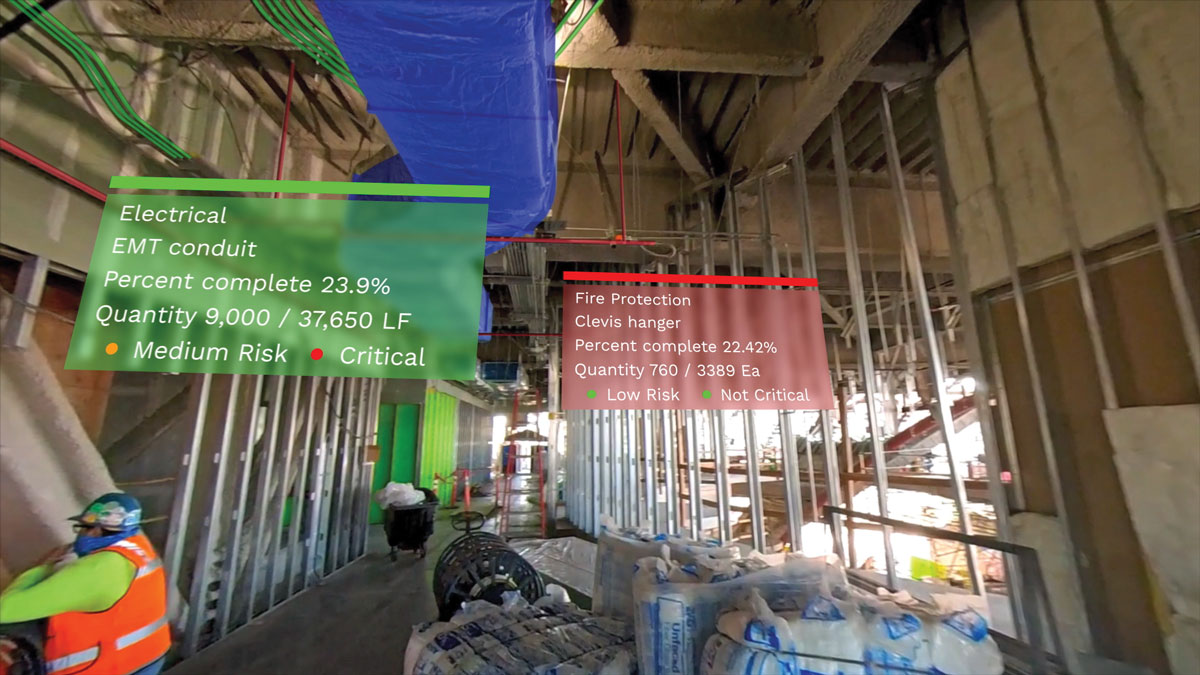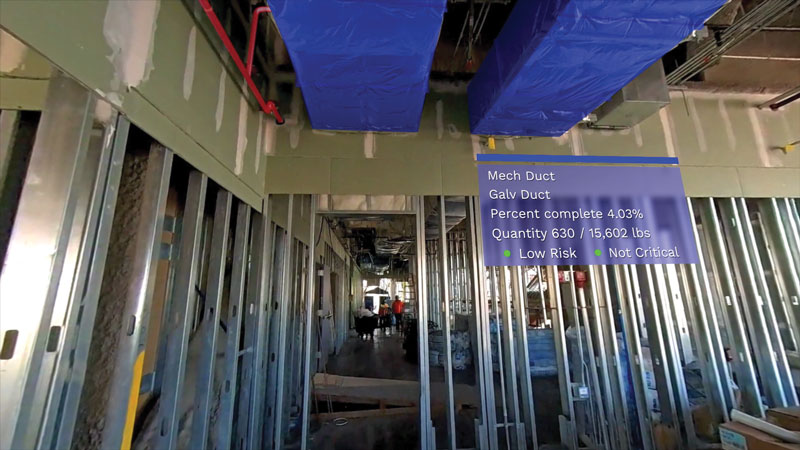
The use of artificial intelligence (AI) is spreading into all aspects of life and work, and the construction industry is no exception as newly developed AI systems deliver incredible efficiency and accuracy to projects at every level. It’s today’s version of the Industrial Revolution.
AI specific for construction
With hundreds of thousands of variables changing every day on a construction jobsite, optimizing outcomes has become a massive problem. To meet this challenge, AI uses computers and machines to mimic human capabilities for solving problems, recognizing patterns and making predictions and decisions based on gathered data. The use of AI makes it possible for machines to learn from experience, adjust to new inputs and perform human-like tasks. As applications continue to grow and become more convenient and available, industries can streamline processes for efficiency and make accurate forecasts at every stage of a project.
Doxel out of Redwood City, Calif., is an AI Powered Project Controls solution–software that contextualizes vast amounts of disparate project data to empower construction teams with an objective view of their project today and an accurate prediction of where it will be tomorrow.
Chief technology officer and co-founder of Doxel, Robin Singh said, “Our products are powered by innovative applications of AI and machine learning (ML) that range from detecting different activity stages of under-construction objects to analyzing this information while projecting the health of the project in terms of cost overrun and time delays. We employ a wide range of ML models of different complexity, ranging from simple heuristics to Fully Convolutional Neural Network (FCNN) model.
“Doxel’s technology works to establish an objective ground truth for a construction project so teams can make decisions based on facts, not guesswork.”
Robin Singh, Doxel, Inc.
“Doxel is the only solution in the market that can take video footage of a jobsite, 3D designs, project budget and project schedule, and tell clients exactly how much progress has occurred on their jobsite today and how much will occur in a week, a month or a year. It can tell clients how delayed their project will be and how much money this delay will cost. This look into the future is unique to Doxel and enables our clients to proactively mitigate schedule delays and cost overruns, [which is] critical when a single week of delay can result in millions of dollars of losses.”
How it works
As shown graphically on the Doxel website video (www.doxel.ai), “All construction monitoring starts with walking the site. Doxel partners with project teams using state-of-the-art technology to capture hundreds of thousands of square feet of the project to build a ‘digital twin’ of the site on a weekly basis. Perception algorithms can identify the current state of each planned component and automatically quantify the total progress for each system.” From this information every scheduled activity is tracked, including over/under and projected substantial completion date, while also tracking project cost performance for deviation from plan and forecasting estimate at completion.
To access these powerful AI capabilities, users do not need any advanced training as Doxel integrates seamlessly with a project’s Building Information Modelling (BIM), scheduling and budget.

The bottom line
AI brings vastly increased efficiency for both gathering and interpreting huge volumes of data that manual analysis cannot provide. Through real-time predictive computer vision technology that collects and analyzes data quickly and accurately, project managers can see where a project is heading and plan accordingly. Also, with advance notice of project delays and cost overruns, risks can be mitigated to improve project outcomes.
“Doxel delivers specific capabilities that we don’t see in the market today,” Singh said. “Our product can track all trades and systems within any project type with 100 per cent coverage of the site to a degree of accuracy to the 100th decimal point, turning around critical insights every 72 hours with predictions that are 96 per cent accurate after the second scan.”
This means amazing control over every aspect of the project. According to Doxel research, on average, without Doxel, customers receive progress data for their jobsite every three to six weeks with about 20 per cent of that data incorrectly reported. Typically, building owners and contractors without Doxel can only track a fraction of the total project – maybe 15 per cent for a large customer.
The visible future
“As the developer of the first AI-Powered Project Controls Solution for the construction industry, Doxel’s technology works to establish an objective ground truth for a construction project so teams can make decisions based on facts, not guesswork,” Singh said. “It also has the capabilities to contextualize disparate project data and bridge knowledge silos, bringing the entire team into collaboration.
“Doxel’s technology is a fundamental element in the construction industry, seeing the end, or at least a significant decrease in the number of stalled and stagnating construction projects around the globe that are hampering multiple industries.”
The use of AI continues to develop and become present in everyday activities and industries, including construction. This is the new frontier in human achievement, bringing an increased impact on quality of life and work through accelerating processes in a safe, effective and efficient manner.